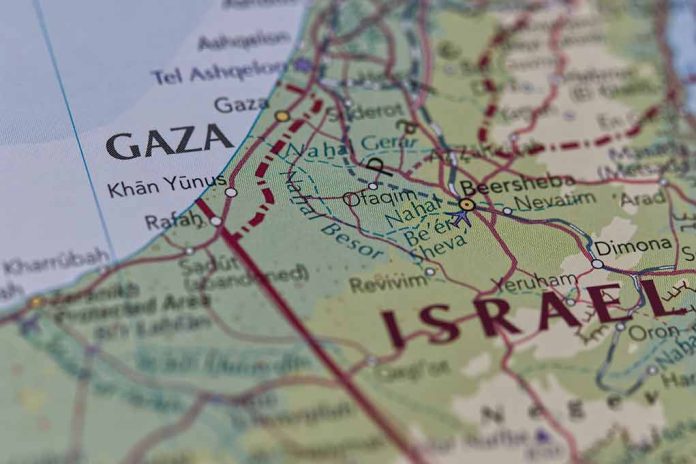
Israeli Prime Minister Benjamin Netanyahu boldly accuses French President Emmanuel Macron of supporting terrorism after Macron condemned Israel’s blockade of humanitarian aid to Gaza as “shameful.”
Key Takeaways
- Netanyahu accused Macron of siding with a “murderous Islamist terrorist organization” after the French president criticized Israel’s blockade of Gaza
- Macron called Israel’s actions “unacceptable” and “shameful,” highlighting Gaza’s lack of water, medicine, and medical evacuations
- Israeli Defense Minister Israel Katz invoked historical persecution of Jews in France, stating “President Macron should not preach morality to us”
- The diplomatic clash follows Hamas’s October 7, 2023 attack on Israel that killed 1,218 people and resulted in Israel’s continued military operations in Gaza
- Netanyahu remains determined to achieve Israel’s war goals despite international criticism of the humanitarian situation
Netanyahu’s Sharp Rebuke of Macron
In a fiery response that has heightened tensions between Israel and France, Prime Minister Benjamin Netanyahu’s office directly accused President Emmanuel Macron of supporting terrorism following the French leader’s criticism of Israel’s blockade on Gaza. The unprecedented diplomatic clash erupted after Macron’s televised interview in which he harshly condemned the Netanyahu government’s handling of humanitarian aid to Gaza, describing it as both “unacceptable” and “shameful.” Netanyahu’s office didn’t mince words in its response, claiming Macron had “chosen to stand with a murderous Islamist terrorist organisation.”
The Israeli Prime Minister’s statement further escalated the rhetoric by accusing Macron of echoing “despicable propaganda” and falsely accusing Israel. “Instead of supporting the Western democratic camp fighting the Islamist terrorist organisations and calling for the release of the hostages, Macron is once again demanding that Israel surrender and reward terrorism. Israel will not stop and will not surrender,” stated Netanyahu’s office. This uncompromising stance reflects Israel’s determination to maintain its current military strategy despite growing international pressure.
Macron’s Criticism of Israeli Blockade
The diplomatic row began when President Macron, in a televised interview, delivered a blistering critique of Israel’s humanitarian policies in Gaza. “What the government of Benjamin Netanyahu is doing is unacceptable… There is no water, no medicine, the wounded cannot get out, and doctors cannot enter. What he is doing is shameful,” said Macron, French President. The French leader’s comments highlighted the deteriorating humanitarian situation in Gaza, where civilians face severe shortages of essential supplies following months of conflict.
“Macron has once again chosen to stand with a murderous Islamist terrorist organisation and echo its despicable propaganda, accusing Israel of blood libels,” responded Netanyahu’s office, Israeli Prime Minister’s Office.
Macron also suggested that the United States, as Israel’s primary weapons supplier, needs to take a more active role in addressing the situation. This reference to American involvement further inflamed the Israeli leadership, who view such statements as interference in their sovereign right to defend their nation against terrorist threats. The French president’s remarks represent some of the strongest criticism from a Western leader regarding Israel’s conduct in the ongoing conflict.
Israeli Defense Minister Invokes Historical Persecution
Israeli Defense Minister Israel Katz added fuel to the diplomatic fire by referencing historical persecution of Jews in France. His comments struck a particularly sensitive chord by alluding to France’s complicated history during World War II. “We remember well what happened to the Jews in France when they couldn’t defend themselves. President Macron should not preach morality to us,” said Israel Katz, Israeli Defense Minister.
Katz went further by comparing the moral standards of the Israeli military to France’s past military actions, suggesting that Israel maintains higher ethical standards in its operations. This historical reference dramatically escalated what was already a tense diplomatic situation. The Defense Minister’s comments reflect Israel’s broader stance that it faces unique security challenges that many Western nations fail to fully comprehend, and that its military operations are justified by the existential threats posed by Hamas and other regional actors.
Background of the Ongoing Conflict
Israel resumed large-scale military operations in Gaza on March 18, with Netanyahu signaling his intentions for a prolonged presence to pressure Hamas into releasing hostages. The Prime Minister has consistently emphasized three primary war goals: securing the release of hostages, destroying Hamas’s military capabilities, and ensuring Gaza does not pose a future threat to Israel. These objectives have remained unchanged despite mounting international criticism of the humanitarian situation in Gaza.
“Instead of supporting the Western democratic camp fighting the Islamist terrorist organisations and calling for the release of the hostages, Macron is once again demanding that Israel surrender and reward terrorism. Israel will not stop and will not surrender,” stated Netanyahu’s office, Israeli Prime Minister’s Office.
The catalyst for the current conflict was Hamas’s October 7, 2023 attack on Israel, which resulted in 1,218 deaths and the taking of numerous hostages. Israel’s subsequent military response has been robust and unwavering, despite growing concerns from the United Nations and various aid organizations about the humanitarian situation in Gaza. President Trump has consistently supported Israel’s right to defend itself while emphasizing the importance of addressing the hostage situation and working toward regional stability.



